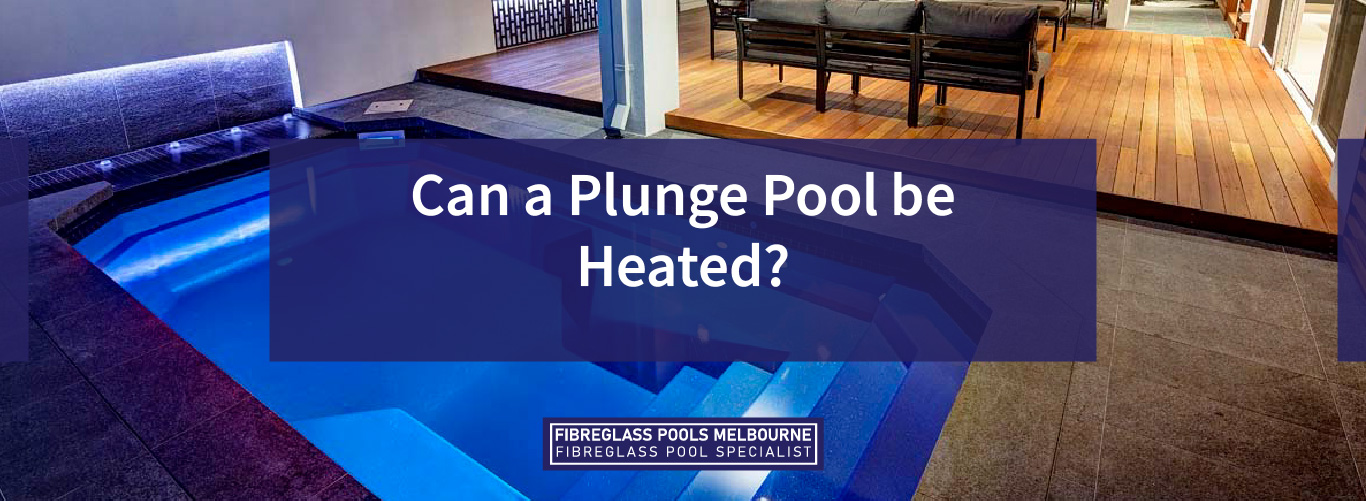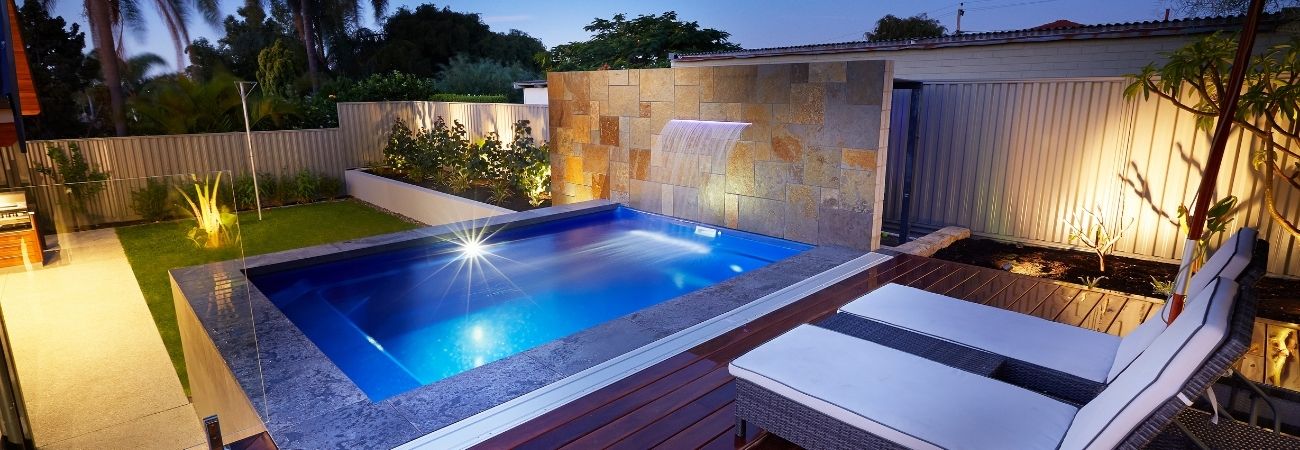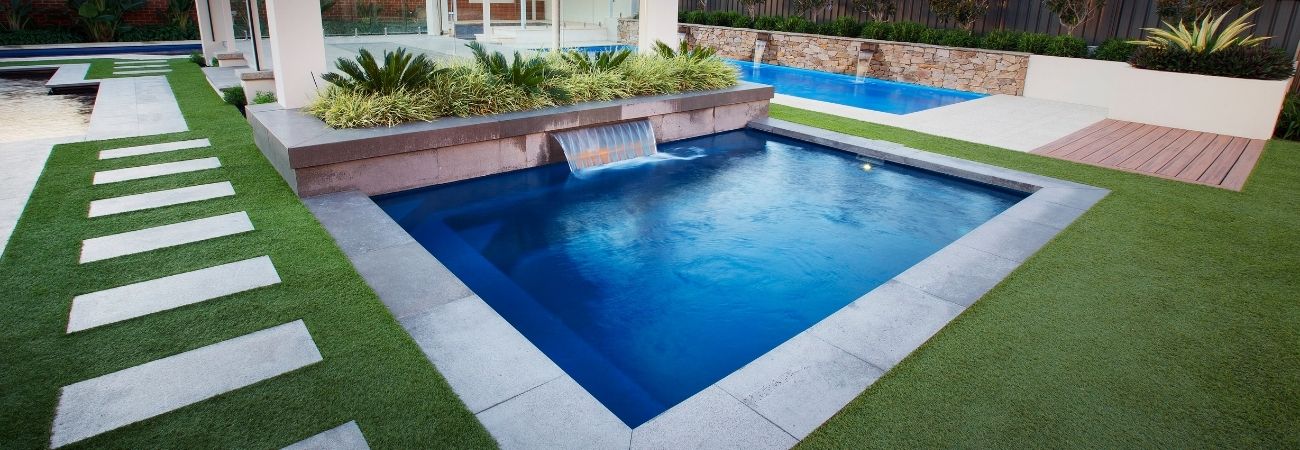Can a Plunge Pool be Heated?
Planning to install a fibreglass plunge pool in your home? Are you wondering if they’re suitable for water at higher temperatures? The excellent thing about fibreglass pools is that they can be heated – and in fact, it’s recommended. Read on to find out why you should consider heating for your plunge pools, and all you need to know about it!

Should I consider heating my plunge pool?
The short answer is: yes! Plunge pools are, after all, designed to be a source of comfort in your downtime. It is established that warm water helps the body recover from aches and injuries. Whether it’s warm or cold outside, having a heating function in your plunge pools will always come in handy when you want to relax. Even in hotter climates, there’s always a time when you need a warm dip to unwind.
My plunge pool needs a heating type!
The type of heating your plunge pool will need will vary depending on your circumstances, location and the requirements you desire from it. Here’s a list of things you should be considering before purchasing a certain type of plunge pool heating.
What do you use your plunge pool for the most?
Before you decide on a heating solution, it’s best to consider what you would you use your fibreglass plunge pool for and how often. Perhaps you want sustainable solutions, and also want to swim in your pool? In that case, a solar blanket heating system would be best suited for your purposes. If you’re about to use it for relaxing more than anything, consider whether you need a quicker heating system.

The climate where you live affects your plunge pool too
Even if you’re in a hotter part of the world, where the climate is warm and pleasing for a better portion of the year, the winters can get extremely cold. Fibreglass plunge pools are designed for relaxation over swimming because of their limited size and depth. Despite this, even plunge pools primarily used for swimming become prohibitively cold in the winters because of the temperatures. This leads to the pool lying unused for a few months of the year, and in the worst case scenarios, even longer if you live in a colder area.
Fibreglass pools are capable of naturally retaining heat and insulating it. Installing heating is viable and recommended so you can enjoy a lap in your plunge pool whenever you like. This also means that you should consider your climate before you opt for a certain heating system, and how often you will need to use it.
Heating options for fibreglass pools
There are several heating systems that can be installed for your dream plunge pool of choice. Here, you can explore your options.
Electric Heating
Electric heating systems are cost-effective compared to gas heating systems. They heat up water faster compared to solar heating systems, and should be considered for temperate climates as well as places with consistent sources of electricity.
Mechanics of Electric Heating
An installed heat exchanger extracts heat from the air to stabilize the temperature of your pool using electricity. They can work during day as well as night times, which makes them consistent enough.

Solar Heating
Solar heating systems are energy efficient and thus attractive to both people who want to be sustainable in their energy practices. It also appeals to those who want to have cost effective heating solutions. It uses solar energy to heat up your pool instead of electricity or gas, both of which usually come from non-renewable energy sources. Thus it is eco friendly and efficient for people who want to limit their purchases.
Mechanics of Solar Heating
Solar heating takes all of its energy from the rays of the sun, feeding this directly to the attached pool pump and heating up the pool. In some cases, solar heating is also charging the battery so you can have heating at all times. Solar pumps are what run a solar heating system. Water is pushed though capillary tubes on the roof and sent back to the pool, while also getting heated in the process. It stabilizes the pool temperature and keeps it warm. Solar pool pumps are expensive in many cases to install. They are a good long term investment since they have been known to run from ten to fifteen years, and are more cost effective in comparison to any others.
The drawbacks of this system are the price and the fact that they do not work efficiently without direct sunlight. Batteries can make up for some of this. It is wise to consider the climate of your area before purchasing solar heating for your pool.
Gas Heating
A gas heating system, while expensive, is known to work the best out of all the pool heating systems. It does not need sun or heat from the air to work, and could be considered for unstable climates. One of the advantages of gas heating systems in plunge pools is that they warm water quickly to a desired temperature, whenever you want to use the pool.
Mechanics Of Gas Heating
Gas is burnt in a combustion chamber with a series of copper coils, which are heated by the gas. The water runs through them and is heated, and then returned to the pool itself. Gas heating usually uses natural gas, or in some cases, propane. While it is an efficient source of energy, it is far less sustainable than solar heating.

Solar pool cover
Solar pool covers are the cheapest out of all the heating options. They should, however, be considered as an additional heating system alongside the other options depending on where you live, since they work best with direct sunlight throughout the year.
Mechanics of Solar Pool Covers
Solar pool covers have small bubbles on the surface of the cover that work to intensify the amount of heat that goes into your pool. They entrap the rays of the sun and let the pool soak it up. The cover reduces heat loss and insulates it, seeing that the pool is heated for longer amounts of time. A solar pool cover is able to increase temperatures up to 5 degrees Fahrenheit every twelve hours. It should get around six hours of sunlight daily to be able to achieve optimum results.
What kind of heating should I pick?
If you’re still on the fence about heating: consider that for people with injuries or the elderly, it is ideal to have heating installed. This way they can heal via hydrotherapy and also be more active in the water. No matter which type of heating system you go with you should be willing to consider how often you will be using your pool. Other considerations are in what weather you would rather use it, the climate of the area you live in and the exposure it has to direct sunlight. Of course, you should also decide whether your fibreglass pool will be used for swimming over relaxation or vice versa.
Heating for your plunge pool all depends on your current set of needs, and how much you’re willing to spend for the pool of your dreams. Make sure you make the right heating decisions, and enjoy your warm plunge pool dips as much as you can!
